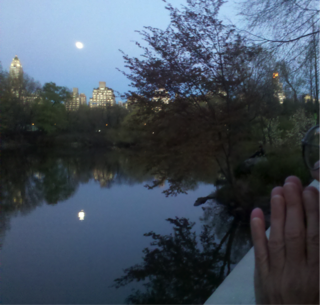Autism
To Say "I" Means To Be Alone
Loneliness: where depersonalization meets autism.
Posted August 12, 2017
Feeling lonely often also means feeling different. Every so often a person with this particular type of loneliness comes for help. “I feel like a stranger. A stranger to others and a stranger to myself. I do not feel myself, I do not know who I am and what I am. I do not know how to talk to others. The more I want to relate to the world the more I feel isolated and withdrawn. I avoid all gatherings and rarely even talk in public. I just do not belong. I feel Detached. Unreal. Estranged. I feel like a crying hermit.”

This loneliness could be often understood just as a human condition, as a transient part of finding self-identity. The fact that a person searches for help to understand her inner world, does not suggest the need for a diagnosis. In cases where presentations of detachment, isolation and loneliness do reach the point of clinical disorders and social maladaptation, these presentations remain in a gray area that does not clearly and fully meet the criteria for an exact diagnostic category. This kind of loneliness presents a mixture of the elements of two different phenomena: depersonalization and autism. The feelings of being different and unreal appear close to depersonalization; whereas the feelings of being isolated and withdrawn – to autism. Moreover, certain characteristic signs seem to maintain an affinity to both depersonalization and autism. Thus detachment on the one hand carries a distinctive connotation of depersonalization and derealization, but on the other hand detachment forms the center of the social standoffishness that is indicative of an autistic spectrum.
Typically this loneliness grows alarmingly painful and maladaptive during the stage of adolescent identity crisis with its accentuated focus on both the internal world of the self and the external world of social relations. Teenagers with “light” subclinical presentations of this loneliness are often advised “just take this developmental condition easy.” Teenagers with more complex and prominent presentations sometimes face the frustration of “not being heard.” Deeply self-observant, knowing their loneliness is not merely backwards and forwards but also contrariwise, they agonize over their failure to communicate their own experience the way it would be recognized by others. Acute development of reflection along with the gap between deep inner experiences and poor ability to convey them are known attributes of depersonalization as well as a particular form of autism, called “rich autism”.
This kind of loneliness appears as an experience where depersonalization and autism merge. Their amalgamate centers around the self, the feeling of “I”. The self or “I” stands at the core of both concepts. Depersonalization means the disturbance of personalization, unreality and void of one’s own personhood. In other words, depersonalization is a disorder of the feeling of “I”. The word “autism” means “I”- ness. Auto is self or “I” in Greek. The more socially accepted Jungian term “introversion” touches upon the same qualities – a focus on the deep internal world and an uneasiness of communication with the external world. Introversion (from Latin) means “turning inside.” Thus the meanings of these three terms – depersonalization, autism and introversion – are congruent in their relatedness to “I” or self.
The affinity between depersonalization and autism has been a matter of serious exploration for as long as both these conceptions have existed. The first self-proclaimed person with depersonalization, Amiel, who invented this very term, had autistic features. The first descriptions of autism were concerned with autistic thinking, a stream of associations guided by internal subjective meanings and thoughts. The very term “autistic” was chosen to emphasize the “special inner logic,” based on idiosyncratic subjective experience, in contrast to common sense logic representing conventional standards. For example, take the word “glass”. A “normal”/conventional association would be “water” (content) or “drink” (characteristic action). In contrast to this conventional reasoning based on the stereotypes of external world, autistic associations reflect images and ideas of the world of internal fantasies. Thus, an autistic association to the word “glass” could be “grass” (“contains similar letters”) or “rooster” (“because they both produce sounds: glass when it is getting broken, and the rooster when it is getting up at the sunrise).
Eugene Bleuler, who first described autism, considered it intimately connected to depersonalization. German language psychiatry has established a solid tradition of exploring the syntropy of autism, depersonalization and dereism. Dereism means de-re(ality): unreality of surroundings. It is what later English psychiatry named derealization.
Autistic loneliness stems from the intense urge to find my own “I,” different from others and at the same related to and accepted by others. Fleeting elements of depersonalization and autistic spectrum/introversion are widely observed in the general population, especially in adolescent and young adult periods. The title of this note - To Say “I” Means To Be Alone – is a quote from the diary of a teenager tasting the bitterness of life, feeling alone, different, sick, estranged; struggling over relationships with peers, finding refuge in dreaming and continuing analysis of himself. First he wanted to be a lawyer (like his father), then graduated from medical school (like his highly respected physician), only to turn out to be a world-renowned philosopher. Karl Jaspers - at 28 authored the masterpiece General Psychopathology and later became one of the founding fathers of the philosophy of existentialism that explores loneliness, authenticity and meaning of life. He surely knew this first hand: “To say “I” means to be alone.”



